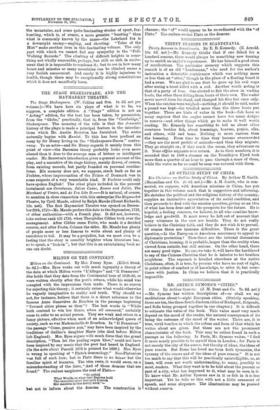THE STAGE SHAKESPEARE, AND THE HAYMARKET THEATRE.
The Stage Shakespeare. (W. Collins and Son. is. 3d. net per volume.)—We have here six plays of what is to be, we suppose, a complete edition. A " Stage " edition is not an "Acting" edition, for the text has been taken, by permission, from the "Globe," practically, that is, from the "Cambridge," Shakespeare. The meaning of the title is that the dramatic history of the plays is made a principal feature in the introduc- tions which Mr. Austin Brereton has furnished. The series naturally begins with Hamlet. To this has been prefixed an essay by Sir Henry Irving on the " Shakespeare-Bacon " contro- versy. To an actor--and Sir Henry regards it mainly from this point of view—the Baconian theory probably looks even more absurd than it does to the average man of letters or intelligent reader. Mr. Brereton's introduction gives a general account of the play, and a narrative of its stage history, mainly drawn, of course, from existing records, but partly founded on personal recollec- tions. His memory does not, we suppose, reach back as far as Pechter, whose impersonation of the Prince of Denmark was in some respects of a very remarkable kind. If Fechter could only have spoken English The other plays included in the present instalment are Coriolanus, Julius Cesar, Romeo and Juliet, The Merchant of Venice, and As You Like It.—It is natural, of course, to mention in close connection with this enterprise The Haymarket Theatre, by Cyril Mande, edited by Ralph Maude (Grant Richards, 12s. net). The first Haymarket Theatre was opened on Decem- ber 29th, 1720—Mr. Maude prefers this date to the September, 1723, of other authorities—with a French play. It did not, however, take serious rank till 1733, when Theophilns Cibber took over the management. After Cibber came Foote, who made it a decided success, and after Foote, Colman the elder. Mr. Maude has plenty of people more or less famous to write about and plenty of anecdotes to tell. It may be a prejudice, but we must own to a, feeling that the story is sensibly brighter when literature has, so to speak, a " look-in "; but that this is an entertaining book no one can doubt.


























































 Previous page
Previous page